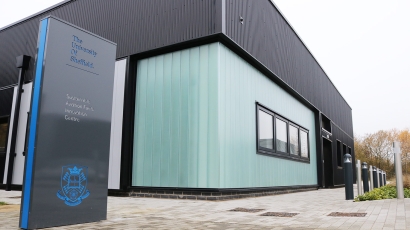
The University of Sheffield's Energy Institute will be working with OEMs (original equipment manufacturers), the aviation industry and operational partners to ensure the scientific integrity of the data used in the project, and to demonstrate the leading role and reputation of UK academia as a global knowledge center for research that advances net zero aviation.
The University of Sheffield's Sustainable Aviation Fuels Innovation Center (SAF-IC) - the first center of its kind in the UK and located on the Sheffield and Rotherham border - will undertake the pre-screening of SAF at its world-class SAF characterization lab. SAF-IC will test, validate and certify new SAF, providing the UK with much-needed testing capabilities to facilitate ASTM approvals and bring SAF fuels to the market.
Professor Mohamed Pourkashanian, Head of the University of Sheffield Energy Institute, said, "We are delighted to be working on this prestigious and timely project to deliver the first transatlantic net-zero flight. "Through this partnership of world-leading aviation experts from industrial and academic backgrounds, we're going to help make sustainable aviation fuels a reality for long-haul flights.
"The facilities at the University of Sheffield - including the Sustainable Aviation Fuels Innovation Center - are the first of their kind in the UK and are at the cutting edge of SAF development, characterization and testing. We're excited to join this project to deliver the fuel which will drive the decarbonization of the aviation sector, and secure greener, cleaner flights for the future."
The flight - on one of Virgin Atlantic's flagship Boeing 787s, powered by Rolls-Royce Trent 1000 engines - is expected to be fuelled by SAF made primarily from waste oils and fats, such as used cooking oil. The use of 100% SAF on the flight, combined with carbon removal through biochar credits – a material which traps and stores carbon taken from the atmosphere – will make the flight net zero.
When fully replacing kerosene, SAF can slash lifecycle carbon emissions by over 70% compared to conventional fossil jet fuel. Not only will SAF be key in decarbonizing aviation, but it could create a UK industry with an annual turnover of £2.4bn by 2040, and support up to 5,200 UK jobs by 2035.
Aviation is one of the hardest sectors to decarbonize and without urgent collaborative action it could be one of the highest emitting sectors for greenhouse gases by 2050. To tackle this, the government published the Jet Zero Strategy in July 2022 which sets out its approach for decarbonising the sector and champions SAF as one of the main tools for achieving Jet Zero.
Challenges remain, however, including the need to scale up SAF production and the existing limit on how much SAF is permitted in jet engines by current fuel specifications. Today, a maximum of 50% SAF blended with kerosene can be used in commercial jet engines. By using 100% SAF, the transatlantic flight will demonstrate the potential to decarbonize long-haul routes and bring us a step closer to net zero aviation.
Other challenges preventing a higher uptake of SAF include high fuel production costs, technology risk at commercial scale and feedstock availability. To address these, the government is working to set the UK up to be a global leader in the development, production and use of SAF, allowing us to progress towards net zero flying, and creating thousands of green jobs.
It is introducing a SAF mandate requiring at least 10% of jet fuel to be made from sustainable sources by 2030 to create secure and growing demand, continuing to invest in a domestic SAF industry through the £165m Advanced Fuels Fund, and working with the industry and investors to understand how to secure long-term investment into the sector. Along with this ground-breaking flight, these measures will support a growing role for SAF in the future of everyday flying.
As well as delivering cleaner skies, the development of a domestic industry for the production of SAF has the potential to improve fuel security and support thousands of green jobs. In 2020, it was estimated that a UK SAF industry could generate a GVA of up to £742m annually and support up to 5,200 UK jobs by 2035.
A further 13,600 jobs could be generated from the growing market for SAF through global exports – helping to level up the UK and boost the economy.
Delivering the transatlantic flight will help to gather the data needed to support ongoing and future work to test and certify higher blends of SAF and it's non-CO2 impacts, while exploring how operational efficiency improvements, flight optimisation and carbon removals can contribute to achieving net-zero flights – not just in the UK, but for the global aviation industry.

